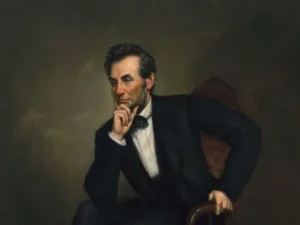 Abraham Lincoln
Abraham Lincoln
16th president of the United States
Also known as: Honest Abe, The Great Emancipator, The Rail-splitter
Abraham Lincoln portrait
Abraham Lincoln portrait Abraham Lincoln, oil on canvas by George Healy, 1887; in the National Portrait Gallery, Smithsonian Institution, Washington, D.C.
Top Questions
What were Abraham Lincoln’s politics?
How did Abraham Lincoln get into politics?
What were Abraham Lincoln’s chief goals in the American Civil War?
News • Abraham Lincoln statue vandalized in Lincoln Park • (CBS)
Abraham Lincoln
Abraham Lincoln Abraham Lincoln, photograph by Anthony Berger of the Mathew Brady Studio, February 9, 1864.
Abraham Lincoln (born February 12, 1809, near Hodgenville, Kentucky, U.S.—died April 15, 1865, Washington, D.C.) was the 16th president of the United States (1861–65), who preserved the Union during the American Civil War and brought about the emancipation of enslaved people in the United States.
Lincoln and his cabinet
1 of 2
Lincoln and his cabinetU.S. Pres. Abraham Lincoln (seated center) and his cabinet, with Lieut. Gen. Winfield Scott, in the council chamber at the White House, lithograph, 1866.
Abraham Lincoln: statue at the Lincoln Memorial
2 of 2
Abraham Lincoln: statue at the Lincoln Memorial Statue of Abraham Lincoln at the Lincoln Memorial, Washington, D.C.
Among American heroes, Lincoln continues to have a unique appeal for his fellow compatriots and also for people of other lands. This charm derives from his remarkable life story—the rise from humble origins, the dramatic death—and from his distinctively human and humane personality as well as from his historical role as savior of the Union and emancipator of enslaved people. His relevance endures and grows especially because of his eloquence as a spokesman for democracy. In his view, the Union was worth saving not only for its own sake but because it embodied an ideal, the ideal of self-government. In recent years, the political side to Lincoln’s character, and his racial views in particular, have come under close scrutiny, as scholars continue to find him a rich subject for research. The Lincoln Memorial in Washington, D.C., was dedicated to him on May 30, 1922.
Quick Facts
Byname: Honest Abe, the Rail-Splitter, or the Great Emancipator
Born: February 12, 1809, near Hodgenville, Kentucky, U.S.
Died: April 15, 1865, Washington, D.C. (aged 56)
Title / Office: presidency of the United States of America (1861-1865), United States House of Representatives (1847-1849), United States
Political Affiliation: Republican Party Whig Party
Awards And Honors: Hall of Fame (1900)
Read about assassination and attempts involving U.S. presidents and presidential candidates.
Life
Follow Abraham Lincoln from a frontier cabin to the White House where he guided America through the Civil War1 of 2
Follow Abraham Lincoln from a frontier cabin to the White House where he guided America through the Civil WarAn overview of the life of Abraham Lincoln.
See all videos for this article
Lincoln’s boyhood home
2 of 2
Lincoln’s boyhood homeLog cabin, Abraham Lincoln’s boyhood home, Knob Creek, Kentucky, originally built early 19th century.
Lincoln was born in a backwoods cabin 3 miles (5 km) south of Hodgenville, Kentucky, and was taken to a farm in the neighboring valley of Knob Creek when he was two years old. His earliest memories were of this home and, in particular, of a flash flood that once washed away the corn and pumpkin seeds he had helped his father plant. His father, Thomas Lincoln, was the descendant of a weaver’s apprentice who had migrated from England to Massachusetts in 1637. Though much less prosperous than some of his Lincoln forebears, Thomas was a sturdy pioneer. On June 12, 1806, he married Nancy Hanks. The Hanks genealogy is difficult to trace, but Nancy appears to have been of illegitimate birth. She has been described as “stoop-shouldered, thin-breasted, sad,” and fervently religious. Thomas and Nancy Lincoln had three children: Sarah, Abraham, and Thomas, who died in infancy.
Childhood and youth
Learn how Abraham Lincoln’s frontier childhood and early appetite for reading shaped his character
Learn how Abraham Lincoln’s frontier childhood and early appetite for reading shaped his character Dramatization of aspects of Lincoln’s childhood in Kentucky and Indiana.
See all videos for this article
In December 1816, faced with a lawsuit challenging the title to his Kentucky farm, Thomas Lincoln moved with his family to southwestern Indiana. There, as a squatter on public land, he hastily put up a “half-faced camp”—a crude structure of logs and boughs with one side open to the weather—in which the family took shelter behind a blazing fire. Soon he built a permanent cabin, and later he bought the land on which it stood. Abraham helped to clear the fields and to take care of the crops but early acquired a dislike for hunting and fishing. In after years he recalled the “panther’s scream,” the bears that “preyed on the swine,” and the poverty of Indiana frontier life, which was “pretty pinching at times.” The unhappiest period of his boyhood followed the death of his mother in the autumn of 1818. As a ragged nine-year-old, he saw her buried in the forest, then faced a winter without the warmth of a mother’s love. Fortunately, before the onset of a second winter, Thomas Lincoln married Sarah Bush Johnston, who moved from Kentucky to Indiana to make a family with Thomas Lincoln. A widow with two girls and a boy of her own, she had energy and affection to spare and ran the household with an even hand, treating both sets of children as if she had borne them all, but she became especially fond of Abraham, and he of her. He afterward referred to his stepmother as his “angel mother.”
Civil rights leader Reverend Martin Luther King, Jr. delivers a speech to a crowd of approximately 7,000 people on May 17, 1967 at UC Berkeley’s Sproul Plaza in Berkeley, California.
Britannica Quiz
Who Said It? Famous Quotes Quiz
Clear up pop culture myths about Abraham Lincoln1 of 2
Clear up pop culture myths about Abraham LincolnLearn about the creative license moviemakers have taken in films about Abraham Lincoln.
See all videos for this article
Learn how reading Shakespeare and the King James Bible helped Abraham Lincoln compose his best-remembered address in American history2 of 2
Learn how reading Shakespeare and the King James Bible helped Abraham Lincoln compose his best-remembered address in American historyLearn how Abraham Lincoln’s studying of William Shakespeare and the King James Bible helped him to compose perhaps the best-remembered address in American history.
His stepmother doubtless encouraged Lincoln’s taste for reading, yet the original source of his desire to learn remains something of a mystery. Both his parents were almost completely illiterate, and he himself received little formal education. He once said that, as a boy, he had gone to school “by littles”—a little now and a little then—and his entire schooling amounted to no more than one year’s attendance. His neighbors later recalled how he used to trudge for miles to borrow a book. According to his own statement, however, his early surroundings provided “absolutely nothing to excite ambition for education. Of course, when I came of age I did not know much. Still, somehow, I could read, write, and cipher to the rule of three; but that was all.” Apparently the young Lincoln did not read a large number of books but thoroughly absorbed the few that he did read. These included Parson Weems’s Life and Memorable Actions of George Washington (with its story of the little hatchet and the cherry tree), Daniel Defoe’s Robinson Crusoe, John Bunyan’s Pilgrim’s Progress, and Aesop’s Fables. From his earliest days he must have had some familiarity with the Bible, for it doubtless was the only book his family owned.
In March 1830 the Lincoln family undertook a second migration, this time to Illinois, with Lincoln himself driving the team of oxen. Having just reached the age of 21, he was about to begin life on his own. Six feet four inches tall, he was rawboned and lanky but muscular and physically powerful. He was especially noted for the skill and strength with which he could wield an ax. He spoke with a backwoods twang and walked in the long-striding, flat-footed, cautious manner of a plowman. Good-natured though somewhat moody, talented as a mimic and storyteller, he readily attracted friends. But he was yet to demonstrate whatever other abilities he possessed.
After his arrival in Illinois, having no desire to be a farmer, Lincoln tried his hand at a variety of occupations. As a rail-splitter, he helped to clear and fence his father’s new farm. As a flatboatman, he made a voyage down the Mississippi River to New Orleans, Louisiana. (This was his second visit to that city, his first having been made in 1828, while he still lived in Indiana.) Upon his return to Illinois he settled in New Salem, a village of about 25 families on the Sangamon River. There he worked from time to time as storekeeper, postmaster, and surveyor. With the coming of the Black Hawk War (1832), he enlisted as a volunteer and was elected captain of his company. Afterward he joked that he had seen no “live, fighting Indians” during the war but had had “a good many bloody struggles with the mosquitoes.” Meanwhile, aspiring to be a legislator, he was defeated in his first try and then repeatedly reelected to the state assembly. He considered blacksmithing as a trade but finally decided in favor of the law. Already having taught himself grammar and mathematics, he began to study law books. In 1836, having passed the bar examination, he began to practice law.
Prairie lawyer
Lincoln Home National Historic Site, Springfield, Illinois
Lincoln Home National Historic Site, Springfield, Illinois
The next year he moved to Springfield, Illinois, the new state capital, which offered many more opportunities for a lawyer than New Salem did. At first Lincoln was a partner of John T. Stuart, then of Stephen T. Logan, and finally, from 1844, of William H. Herndon. Nearly 10 years younger than Lincoln, Herndon was more widely read, more emotional at the bar, and generally more extreme in his views. Yet this partnership seems to have been as nearly perfect as such human arrangements ever are. Lincoln and Herndon kept few records of their law business, and they split the cash between them whenever either of them was paid. It seems they had no money quarrels.
Within a few years of his relocation to Springfield, Lincoln was earning $1,200 to $1,500 annually, at a time when the governor of the state received a salary of $1,200 and circuit judges only $750. He had to work hard. To keep himself busy, he found it necessary not only to practice in the capital but also to follow the court as it made the rounds of its circuit. Each spring and fall he would set out by horseback or buggy to travel hundreds of miles over the thinly settled prairie, from one little county seat to another. Most of the cases were petty and the fees small.
The coming of the railroads, especially after 1850, made travel easier and practice more remunerative. Lincoln served as a lobbyist for the Illinois Central Railroad, assisting it in getting a charter from the state, and thereafter he was retained as a regular attorney for that railroad. After successfully defending the company against the efforts of McLean county to tax its property, he received the largest single fee of his legal career—$5,000. (He had to sue the Illinois Central in order to collect the fee.) He also handled cases for other railroads and for banks, insurance companies, and mercantile and manufacturing firms. In one of his finest performances before the bar, he saved the Rock Island Bridge, the first to span the Mississippi River, from the threat of the river transportation interests that demanded the bridge’s removal. His business included a number of patent suits and criminal trials. One of his most effective and famous pleas had to do with a murder case. A witness claimed that, by the light of the moon, he had seen Duff Armstrong, an acquaintance of Lincoln’s, take part in a killing. Referring to an almanac for proof, Lincoln argued that the night had been too dark for the witness to have seen anything clearly, and with a sincere and moving appeal he won an acquittal.
By the time he began to be prominent in national politics, about 20 years after launching his legal career, Lincoln had made himself one of the most distinguished and successful lawyers in Illinois. He was noted not only for his shrewdness and practical common sense, which enabled him always to see to the heart of any legal case, but also for his invariable fairness and utter honesty.
Lincoln’s family
While residing in New Salem, Lincoln became acquainted with Ann Rutledge. Apparently he was fond of her, and certainly he grieved with the entire community at her untimely death, in 1835, at the age of 22. Afterward, stories were told of a grand romance between Lincoln and Rutledge, but these stories are not supported by sound historical evidence. A year after the death of Rutledge, Lincoln carried on a halfhearted courtship with Mary Owens, who eventually concluded that Lincoln was “deficient in those little links which make up the chain of woman’s happiness.” She turned down his proposal.
So far as can be known, the first and only real love of Lincoln’s life was Mary Todd. High-spirited, quick-witted, and well-educated, Todd came from a rather distinguished Kentucky family, and her Springfield relatives belonged to the social aristocracy of the town. Some of them frowned upon her association with Lincoln, and from time to time he, too, doubted whether he could ever make her happy. Nevertheless, they became engaged. Then, on a day in 1841 that Lincoln recalled as the “fatal first of January,” the engagement was broken, apparently on his initiative. For some time afterward, Lincoln was overwhelmed by terrible depression and despondency. Finally the two were reconciled, and on November 4, 1842, they married.
Lincoln and his son
Lincoln and his son Abraham Lincoln with his son Tad, 1864.
Four children, all boys, were born to the Lincolns. Edward Baker was nearly 4 years old when he died, and William Wallace (“Willie”) was 11. Robert Todd, the eldest, was the only one of the children to survive to adulthood, though Lincoln’s favorite, Thomas (“Tad”), who had a cleft palate and a lisp, outlived his father. Lincoln left the upbringing of his children largely to their mother, who was alternately strict and lenient in her treatment of them.
The Lincolns had a mutual affectionate interest in the doings and welfare of their boys, were fond of one another’s company, and missed each other when apart, as existing letters show. Like most married couples, the Lincolns also had their domestic quarrels, which sometimes were hectic but which undoubtedly were exaggerated by contemporary gossips. She suffered from recurring headaches, fits of temper, and a sense of insecurity and loneliness that was intensified by her husband’s long absences on the lawyer’s circuit. After his election to the presidency, she was afflicted by the death of her son Willie, by the ironies of a war that made enemies of Kentucky relatives and friends, and by the unfair public criticisms of her as mistress of the White House. She developed an obsessive need to spend money, and she ran up embarrassing bills. She also staged some painful scenes of wifely jealousy. At last, in 1875, she was officially declared insane, though by that time she had undergone the further shock of seeing her husband murdered at her side. During their earlier married life, she unquestionably encouraged her husband and served as a prod to his own ambition. During their later years together, she probably strengthened and tested his innate qualities of tolerance and patience.
With his wife, Lincoln attended Presbyterian services in Springfield and in Washington but never joined any church. He once explained:
Richard M. Nixon. Richard Nixon during a 1968 campaign stop. President Nixon
Britannica Quiz
U.S. Presidents and Their Years in Office Quiz
When any church will inscribe over its altar, as its sole qualification for membership, the Saviour’s condensed statement of the substance of both Law and Gospel, “Thou shalt love the Lord thy God with all thy heart, and with all thy soul, and with all thy mind, and thy neighbor, as thyself,” that church will I join with all my heart and all my soul.
Abraham Lincoln
Abraham LincolnDaguerreotype of Congressman-elect Abraham Lincoln, c. 1846–47. This is the earliest-known photograph of Lincoln.
Early in life Lincoln had been something of a skeptic and freethinker. His reputation had been such that, as he once complained, the “church influence” was used against him in politics. When running for Congress in 1846, he issued a handbill to deny that he ever had “spoken with intentional disrespect of religion.” He went on to explain that he had believed in the doctrine of necessity—“that is, that the human mind is impelled to action, or held in rest by some power over which the mind itself has no control.” Throughout his life he also believed in dreams and other enigmatic signs and portents. As he grew older, and especially after he became president and faced the soul-troubling responsibilities of the Civil War, he developed a profound religious sense, and he increasingly personified necessity as God. He came to look upon himself quite humbly as an “instrument of Providence” and to view all history as God’s enterprise. “In the present civil war,” he wrote in 1862, “it is quite possible that God’s purpose is something different from the purpose of either party—and yet the human instrumentalities, working just as they do, are of the best adaptation to effect His purpose.”
Lincoln was fond of the Bible and knew it well. He also was fond of Shakespeare. In private conversation he used many Shakespearean allusions, discussed problems of dramatic interpretation with considerable insight, and recited long passages from memory with rare feeling and understanding. He liked the works of John Stuart Mill, particularly On Liberty, but disliked heavy or metaphysical works.
Though he enjoyed the poems of Lord Byron and Robert Burns, his favorite piece of verse was the work of an obscure Scottish poet, William Knox. Lincoln often quoted Knox’s lines beginning: “Oh! why should the spirit of mortal be proud?” He liked to relax with the comic writings of Petroleum V. Nasby, Orpheus C. Kerr, and Artemus Ward, or with a visit to the popular theater.
Early political career of Abraham Lincoln
Explore Abraham Lincoln’s marriage to Mary Todd and time as state lawmaker in Springfield, Illinois
Explore Abraham Lincoln’s marriage to Mary Todd and time as state lawmaker in Springfield, Illinois Description of Abraham Lincoln’s years as a state lawmaker in Illinois, where he was an early advocate of women’s suffrage, and of his marriage to Mary Todd.
See all videos for this article
When Lincoln first entered politics, Andrew Jackson was president. Lincoln shared the sympathies that the Jacksonians professed for the common man, but he disagreed with the Jacksonian view that the government should be divorced from economic enterprise. “The legitimate object of government,” he was later to say, “is to do for a community of people whatever they need to have done, but can


